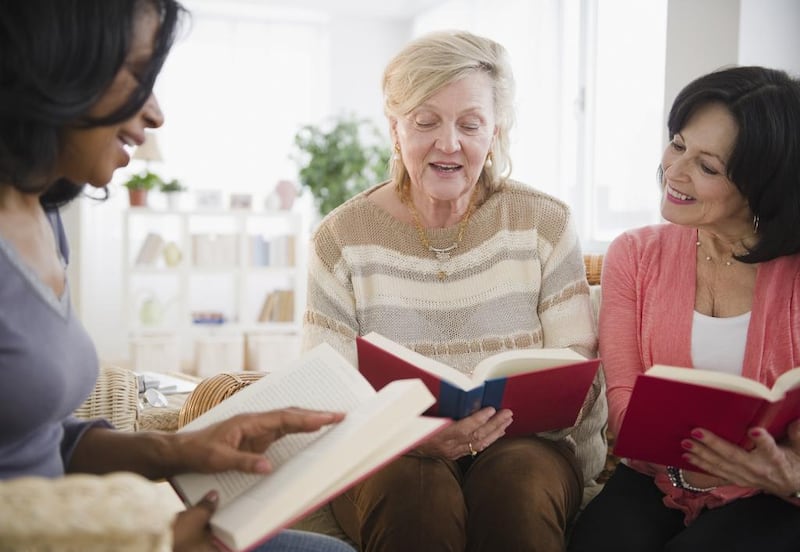For the book lover, something extraordinary can happen as soon as you open a book. Whether it’s that sense of anticipation at a new author’s work or a feeling of welcome familiarity when you pick up a favourite novel, that range of emotional possibility explains why reading is a such a popular pastime.
And while there is something unique and wonderful about the way the mind strives to imagine written words and new worlds, there is something equally pleasing in sharing those experiences with others.
[ Click here to like The National Book Club’s Facebook page ]
If you think that experiencing a book ends when you reach the last sentence then perhaps you should consider joining a book group. This can be the prelude to the hidden chapter, the one that only becomes apparent once different perspectives are shared.
Viewing a book through her friends’ eyes helps Maria Hanif Al Qassim, from Dubai, to catch things in the text that she may have overlooked.
“It’s really nice to get other people’s perspectives on the same thing you’ve read,” she says.
“Because, especially with novels, you really don’t know what the author means by certain events or certain things, or the way a certain character is.”
After some time away from book clubs, Maria has planned to start her own with friends next month.
The last book she discussed as part of a club, Season of Migration to the North by Tayeb Salih, brought home the importance of sharing the reading experience.
Set in postcolonial Sudan, and first published in Arabic in 1966, it is described by cultural critic Edward Said as one of the greatest novels in Arabic literature.
“It really is a tremendous novel,” says the 30-year-old Emirati.
“Really short but very intense, so I know that when I read it there were things that I never thought about, that never even caught my eye, but, when we sat there and discussed it, it was really shocking.
“You know, some things that you really missed because you’re just focused on other things in the novel that are happening. But, when you’re part of the group, your really start to see everything in a different light and it’s a more holistic view of everything that goes on.”
Among the books Maria has discussed with others is Shantaram, by Australian author Gregory David Roberts. Next her group will talk about Mama Hissa's Mice, written in Arabic by Kuwaiti novelist Saud Alsanousi.
Among her friends, Maria will usually suggest a few titles and everyone will decide on what they prefer.
A book group also offers the opportunity to commit to seeing friends, and perhaps, to making new ones.
For some people such as Myriem Boussaad, a book group offers the opportunity to retain bonds of friendship.
“A group of friends and I hadn’t seen each other in a while and thought that this would be a good way to commit to getting together at least once a month,” says the Abu Dhabi resident.
Myriem enjoys the discussions and thoughts that arise from a book group meeting, and each member takes turns in choosing a novel to study.
“The discussions often lead to broader discussions about whatever topic the book touches on. It’s very interesting to hear different opinions from such a diverse group,” she says.
And none could be more varied than those of the members of Dubai Bibliophiles Book Club. More than 800 people have signed up to the group and although not all are active, organiser Ksenija Prekovic says an average of 10 to 15 men and women attend the sessions every three weeks.
One of the strengths of a book group, she says, is helping people to step out of their comfort zone.
“For me and quite a few people, what I keep on hearing is that you get to read the books you wouldn’t normally choose yourselves.
“We all tend to have a certain taste and we go with either familiar authors or we go with certain prizes.”
Ksenija, 39, from Croatia, is a fan of books shortlisted for the Man Booker Prize and has tended not to stray from what she is familiar with. But she says: “Now, I actually read what people suggest and, I have to be honest, I was quite a few times very, very positively surprised. I’ve read some magnificent books that I would have never read if it were just me reading.”
Among the books read by the group this year are Cloud Atlas by David Mitchell, Steppenwolf by Hermann Hesse and The Girl With Seven Names: A North Korean Defector's Story by Hyeonseo Lee. A book is chosen by first, a suggestion, then a chat and then a vote.
For Maria and her fellow bibliophiles, most of whom are Emirati, the group also gives them an opportunity to read in both English and Arabic, with some members starting to get more comfortable reading in their mother tongue.
Either way, it is the words not the language, says Maria, that make the book.
“To me, personally, I find them equally intriguing, both languages.
“It doesn’t matter, it’s a medium. If it’s a good book and the language is descriptive and everything catches you, that’s all that matters.”
Zaineb Al Hassani is a news editor at The National.





